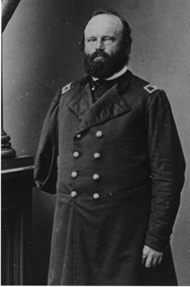 Colonel
Hugo A. Wangelin
Colonel
Hugo A. Wangelin Colonel
Hugo A. Wangelin
Colonel
Hugo A. WangelinAt the outbreak of the Civil War, he accepted a commission on September 7, 1861 as lieutenant colonel in the 12th Missouri Volunteer Infantry Regiment of St. Louis. Promoted to the grade of colonel on July 20, 1862, he continued as commanding officer of the 12th Missouri until July 30, 1863 when he was appointed Commander of the Second Brigade, First Division, XV Corps, Army of the Tennessee. He served in that capacity until August 24, 1863 when he stepped down and reassumed command of the 12th Missouri. He was again appointed brigade commander, this time assigned to the Third Brigade, First Division, XV Corps of the Army of the Tennessee from March 8 until the end of the Atlanta Campaign on September 20, 1864. Upon completion of his service, he led his 3rd, 12th and 17th Missouri Volunteer Infantry Regiments back to St. Louis where they were greeted by a thankful city for service during the war. Colonel Wangelin was temporarily appointed regimental commander of the veteran volunteers in St. Louis until October 24, 1864 when he was finally mustered out of service.
Colonel Wangelin led the 12th Missouri at Pea Ridge, Arkansas in March 1862, then part of Curtis' Army of the Southwest. He was also in command of the 12th Missouri at Arkansas Post and Chickasaw Bayou. He led the 12th Missouri during the successful Vicksburg Campaign, distinguishing himself in the Battle of Jackson, Mississippi. After the reorganization of the Army of the Tennessee during the winter of 1862-1863, he led the Second Brigade under General Osterhaus during the relief of Chattanooga and was severely wounded during the bloody assault on Ringgold Gap, resulting in the amputation of his right arm. After convalescing during the winter of 1863-1864, he was appointed commander of the Third Brigade which included the 3rd, 12th and 17th Missouri throughout the Atlanta Campaign. He suffered another wound during the Battle of Atlanta on July 22, 1864 while moving his brigade across the fire swept Bald Hill in response to a call for assistance from Major General McPherson. McPherson, Commanding the Army of the Tennessee was killed while positioning Wangelin's Brigade. In spite of the terrible loss of their beloved commander, Wangelin's men plugged a dangerous gap in the Union left flank helping to deprive Confederate General Hood of a much needed victory.
In recognition of his heroic service, Wangelin received his brevet as brigadier general in November 1865 after he returned to his home in Bellville. He was appointed postmaster in Bellville on January 12, 1866 and resided in the Postmasters Residence located on the north side of the Public Square. He served as postmaster until March 28, 1873 when he was removed by the Grant Administration as a result of his support for Greeley's candidacy. He was elected 7th Ward Alderman on April 26, 1878 after the city council settled a tied election by casting lots. During his later years he was commander of the local GAR post.
Hugo died on February 28, 1883 at age 64 and after a funeral attended by many distinguished Civil War veterans from the St. Louis metropolitan area, he was laid to rest at Walnut Hills Cemetery. He was survived by his wife Berthe and his children-Richard, Edward, Otto, Walter, Louisa and Anna. Berthe was awarded a pension in November 1883 of $30.00 per month. Recognition of his long and distinguished service to his adopted country continued after his death when on August 27, 1886, the G.A.R. Post in Lebanon was renamed in his honor.
1/27/01
Copyright (c) 2000-2001 Philip R. Hinderberger